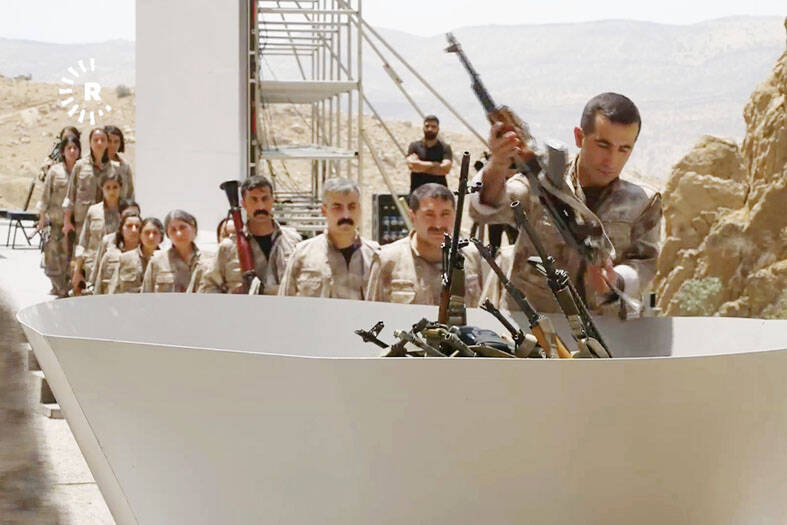Fighters with a Kurdish separatist militant group that has waged a decades-long insurgency in Turkey began laying down their weapons in a symbolic ceremony on Friday in northern Iraq, the first concrete step toward a promised disarmament, as part of a peace process.
The Kurdistan Workers’ Party (PKK) announced in May that it would disband and renounce armed conflict, ending four decades of hostilities. The move came after PKK leader Abdullah Ocalan, who has been imprisoned on an island near Istanbul since 1999, urged his group in February to convene a congress, and formally disband and disarm.
Ocalan renewed his call in a video message broadcast on Wednesday, saying: “I believe in the power of politics and social peace, not weapons.”

Photo: Rudaw TV via AP
Most journalists were not allowed at the site of Friday’s ceremony, in the mountains of Sulaymaniyah Province in northern Iraq’s semiautonomous Kurdish region.
Footage from the event showed fighters casting rifles and machine guns into a large cauldron, where they were then set ablaze.
The PKK issued a statement from the fighters who were laying down their weapons, saying that they had disarmed “as a gesture of goodwill and a commitment to the practical success” of the peace process.
“We will henceforth continue our struggle for freedom, democracy, and socialism through democratic politics and legal means,” the statement said.
The state-run Iraqi News Agency reported that 30 fighters had disarmed “symbolically” on Friday, and that the continuing disarmament process “will take place in stages.”
The process is expected to be completed by September, the agency reported.
Turkish Nationalist Movement Party leader Devlet Bahceli, who initiated the peace process, welcomed the ceremony, saying that it marks “historic developments that signal the end of a dark era.”
Bahceli, who has traditionally maintained a hard-line stance against the PKK, surprised everyone in October last year when he suggested in parliament that Ocalan could be granted parole if he renounced violence and disbanded the PKK.
Turkish President Recep Tayyip Erdogan called Friday’s ceremony an “important step toward our goal of a terrorism-free Turkey.”
The PKK has waged an armed insurgency against Turkey since 1984, initially with the aim of establishing a Kurdish state in the southeast of the country. Over time, the objective evolved into a campaign for autonomy and rights for Kurds within Turkey.
The conflict between militants and state forces, which has spread beyond Turkey’s borders into Iraq and Syria, has killed tens of thousands of people. The PKK is considered to be a terrorist organization by Turkey, the US and the EU.
Previous peace efforts between Turkey and the PKK have ended in failure.
Scores of villages have emptied as a result of the violence. Displaced Kurdish Iraqis have voiced hopes that the peace process would finally allow them to go home.
Officials have spoken of a five-part peace process with the PKK, with the first phase being the political initiative launched by Bahceli, followed by Ocalan’s message in February urging the PKK to abandon the armed struggle.
The next two steps would focus on legal reintegration of the PKK fighters and long-term healing and reconciliation efforts.

In the sweltering streets of Jakarta, buskers carry towering, hollow puppets and pass around a bucket for donations. Now, they fear becoming outlaws. City authorities said they would crack down on use of the sacred ondel-ondel puppets, which can stand as tall as a truck, and they are drafting legislation to remove what they view as a street nuisance. Performances featuring the puppets — originally used by Jakarta’s Betawi people to ward off evil spirits — would be allowed only at set events. The ban could leave many ondel-ondel buskers in Jakarta jobless. “I am confused and anxious. I fear getting raided or even

POLITICAL PATRIARCHS: Recent clashes between Thailand and Cambodia are driven by an escalating feud between rival political families, analysts say The dispute over Thailand and Cambodia’s contested border, which dates back more than a century to disagreements over colonial-era maps, has broken into conflict before. However, the most recent clashes, which erupted on Thursday, have been fueled by another factor: a bitter feud between two powerful political patriarchs. Cambodian Senate President and former prime minister Hun Sen, 72, and former Thai prime minister Thaksin Shinawatra, 76, were once such close friends that they reportedly called one another brothers. Hun Sen has, over the years, supported Thaksin’s family during their long-running power struggle with Thailand’s military. Thaksin and his sister Yingluck stayed

Kemal Ozdemir looked up at the bare peaks of Mount Cilo in Turkey’s Kurdish majority southeast. “There were glaciers 10 years ago,” he recalled under a cloudless sky. A mountain guide for 15 years, Ozdemir then turned toward the torrent carrying dozens of blocks of ice below a slope covered with grass and rocks — a sign of glacier loss being exacerbated by global warming. “You can see that there are quite a few pieces of glacier in the water right now ... the reason why the waterfalls flow lushly actually shows us how fast the ice is melting,” he said.

RESTRUCTURE: Myanmar’s military has ended emergency rule and announced plans for elections in December, but critics said the move aims to entrench junta control Myanmar’s military government announced on Thursday that it was ending the state of emergency declared after it seized power in 2021 and would restructure administrative bodies to prepare for the new election at the end of the year. However, the polls planned for an unspecified date in December face serious obstacles, including a civil war raging over most of the country and pledges by opponents of the military rule to derail the election because they believe it can be neither free nor fair. Under the restructuring, Myanmar’s junta chief Min Aung Hlaing is giving up two posts, but would stay at the